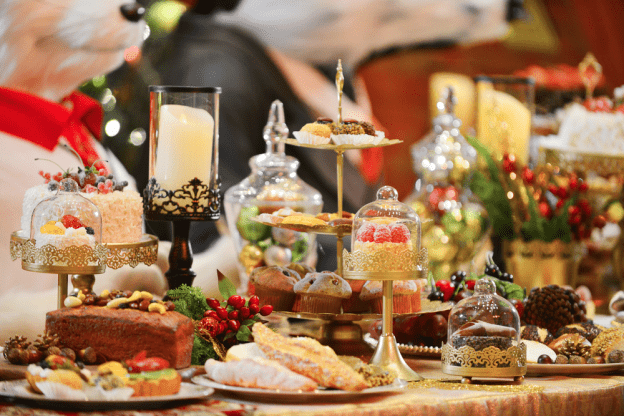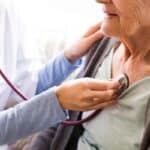Even if you’re not a “foodie” most people look forward to indulging in the culinary delights of holiday time between Thanksgiving and New Year’s Eve. This means that even people who are typically disciplined eat too much in one evening, eat rapidly, imbibe amounts of alcohol they are unaccustomed to, and consume foods that may not be part of their regular diet because “tis the season.” While nobody likes a medical grinch, there are ways to have gastronomic fun without paying the price with holiday heartburn.
Dr. Niket Sonpal is an internist and gastroenterologist at Touro College of Medicine. He shares his tips for having your holiday cake and eating it too.
Heartburn happens when stomach acid flows backward into the esophagus. It can also go by two names: GER (gastroesophageal reflux) or GERD (gastroesophageal reflux disease). GER is also known as acid indigestion, happening only once in a while. GERD is chronic heartburn that can lead to esophageal cancer if left untreated. Here are some of his tips for avoiding holiday heartburn.
Eat light turkey, not dark
High-fat food can spell trouble if you’re prone to heartburn, so do yourself a favor and skip the skin when it comes to turkey time. Your best bet is to eat turkey breast and avoid oilier dark meat. The same goes for gravy. If it’s not fat free, it may be smarter to skip this dish.
Choose baked, not mashed
If you have chronic heartburn, you don’t have to give up your favorite foods. You just have to choose wisely to save yourself some pain later on. For example, mashed potatoes can trigger heartburn, but baked potatoes may not. When it comes to dairy products, the less fat the better. Limit butter and avoid sour cream.
Choose multigrain rolls or bread
When choosing grain-based food for the holiday, you can’t go wrong with multigrain bread or rolls. Cornbread and white bread are good choices too, if you want to avoid heartburn.
One side dish that should be strictly for the kids, however, is macaroni and cheese. This is one of those dishes known to trigger acid reflux, according to the National Heartburn Alliance.
Selecting a salad
Salads are good news for those with chronic heartburn or GERD—if you have the right salad dressing and ingredients, that is. High-fat foods are a known trigger for acid reflux, so the National Heartburn Alliance recommends avoiding creamy salad dressings, as well as oil and vinegar. Your best bet is a low-fat salad dressing, and avoid tomatoes, raw onions, and other acid-aggravating ingredients. (Want fruit in your salad? Choose apples, not oranges, if you want to avoid heartburn.)
Avoid foods that cause heartburn
People who suffer from heartburn often know the trigger foods that cause symptoms. Common foods include chocolates, caffeine and greasy foods. These foods relax the lower esophagus sphincter muscle, when this muscle is relaxed, the food will go back up and cause heartburn. Other foods that can trigger heartburn include acidic foods such as citrus fruits or carbonated beverages. This means avoid Champagne!
Skip Mint Desserts
Candy canes and chocolate mint desserts are best left for others. These dangerous holiday delectables are notorious for helping acid reflux on its way.
Eat more ginger
Ginger is one ingredient that can help ease heartburn, if you don’t get too much of it. (More than 2 to 4 grams per day can actually cause heartburn.)
Ginger is a natural match for root vegetable dishes commonly served during the holidays. Heartburn-friendly vegetables include carrots, cabbage, peas, broccoli, and green beans
Linger Over Your Food
Take the time to eat slowly and enjoy your food. Rushing through your meal or chewing with your mouth open can increase your chances of indigestion or heartburn. Linger over your food and allow yourself to feel full by giving your food time to digest.
Limit Alcoholic Beverages
Have to have that holiday egg nog? Limit it to one glass. This festive beverage can do double the damage. Not only does it contain alcohol that irritates your stomach but it contains the added dose of diary that can cause bloating and gas.
Cut yourself off
After-hours holiday parties can keep you snacking all night, but eating too close to bedtime can make acid reflux worse. Stop eating and drinking (water included) three hours before bedtime.
Ditch the post-meal nap
Sleeping right after eating can increase GERD symptoms. Instead of falling asleep, try going for a walk.
Dr. Niket Sonpal is a native of Long Island NY and a graduate of Medical University of Silesia – Hope Medical Institute in Poland. After completing his residency in Internal Medicine at Lenox Hill Hospital, he was selected to be the 2013‐2014 Chief Resident at Lenox Hill Hospital–Northshore LIJ Health System. He is an Adjunct Assistant Professor at Touro College of Osteopathic Medicine and Clinical instructor at Kingsbrook Jewish Medical Center, Brooklyn. Dr. Sonpal has completed his Fellowship in gastroenterology at Lenox Hill Hospital and will continue his work in the field of medical student and resident test preparation. He is the co‐author for the best-selling Master the Boards: USMLE Step 2 CK, Master the Boards Step 3, And Master the Boards: Internal Medicine.







